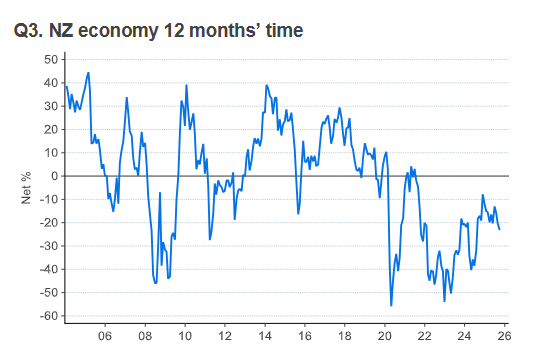
ANZ economists say consumer confidence has passed "peak pessimism" following the unexpectedly poor March quarter GDP (gross domestic product) result.
The ANZ-Roy Morgan Consumer Confidence Index for September rose from 92.0 to 94.6, breaking a 10-month falling trend.
ANZ notes the responses before the March quarter GDP result became known were running at around 96; following the release, they collapsed to 77.
However, that came from a very small sample - just 60 people - "so take it with a large grain of salt."
"The glass-half-full interpretation is that confidence probably would have lifted by more were it not for the GDP headlines," ANZ's economists said.
"The glass-half-empty view is that confidence has probably taken a hit."
The proportion of consumers thinking now is a good time to buy a major household item rose by one point, but remains negative 11%.
Two year-ahead inflation expectations were unchanged at 4.8%, although ANZ says that's unsurprising given food price inflation is running at 5%.
Perceptions of current personal financial situations (better or worse off than last year) lifted 11 points to -13%.
ANZ comments that, while still low, the reading hasn’t been higher than -12% since early 2022.
A net 14% of respondents expect to be better off this time next year, up one point.
Perceptions regarding the economic outlook over the next 12 months fell three points to -23%. The 5-year-ahead measure lifted three points to +6%.
House price inflation expectations dropped from 3.0% to 2.5%, the lowest since July 2024.
ANZ concludes it’s "not all doom and gloom out there."
"The proportion of households saying that they feel worse off than a year ago has been steadily declining, even as unemployment has been creeping higher. Consumer arrears have been dropping, according to credit rating agencies."
"The RBNZ has pivoted to supporting the growth outlook, rather than fretting about the near-term inflation outlook. Monthly filled jobs have returned to modest growth."
Without downplaying the real pressures households are under, ANZ's economists say, "it simply isn’t the case that the economy is spiralling downwards."
ANZ expects expect the economy "to put in a markedly improved performance over the next 12 months than
the last – though that isn’t saying a lot, to be fair.

29 Comments
"ANZ expects (nay, 'hopes') the economy "to put in a markedly improved performance over the next 12 months than
the last – though that isn’t saying a lot, to be fair."
The old model has run its course and is now spent.
Many here seem to hope the economy gets worse.
Care to explain how anything being currently promoted is going to improve things?
They applied the interest rate brakes, it slowed us down, now they are going for the interest rate accelerator again. This has worked time and time again, I don't think this will be an aberration.
The action and result of interest rates is open to interpretation, but even if we accept that narrative what would that do to property values and how would that improve our situation?
You appear to be suggesting that the NZ economy prior to 2024 was in a good space
Property values will probably move with interest rates to the point where affordability remains about the same.
And that improves the NZ economy how?
That itself doesn't, but taking the brakes off does. We get more money to spend.
Some people may take on more debt to spend....not necessarily in the NZ economy...no change other than possibly that.
Meanwhile the infrastructure continues to decline and with it services, the young(er) will continue to emigrate and the clamour for greater immigration into an underprovided economy will grow louder and our ability to provide from within will continue to deteriorate.
Many will get more money to spend from lower interest rates without taking on more debt. We will have an extra $150 a fortnight when we refix soon, and it was an extra $150 last year too, percentage wise that is significant.
The more money we have to spend, the more GST is collected, the more jobs and PAYE is collected, the more sales and company tax collected. This means more money for infrastructure and services.
Is it a structural fix - no. Will it improve the current economy - yes.
You appear to have forgotten about the increased costs that have occurred while that interest rate cycle played out....some will have a little more cash from reduced mortgage rates, what they do with it is uncertain, but more continue to have reduced spending capacity so the aggregate effect will not necessarily be positve.
You're absolutely right JJ. Many just don't understand how long it takes for the lower interest rates to feed through to an improving economy.
And many believe that the 'wealth effect' is both infallible and unconstrained.
Interest rate falls to date have not increased property prices, like they would have historically done in the past.
This is entirely consistent with what happens when supply is greater than demand.
With their new up and out housing policies, when lower interest rates do stimulate demand, then as long as the supply can more easily meet the demand, then we should not get any price increases due to non-value added speculative gains.
Whats exciting about folk spending more. The alternative is building equity and ownership. Now that is exciting stuff, they will be wealthier, and overall their lifetime able to what they want. A better standard of living.
If people don’t spend there are less jobs, less savings, and a worse standard of living.
If people don’t spend there are less jobs, less savings, and a worse standard of living.
Yes indeed. And there is a symbiotic relationship between the Ponzi and this spend. If we apply the 'house prices double every 7-10 yr' theory, we know that there is little need to save when the house does it for you. So we spend to hearts' content: the new spa pool, family holidays to Fiji (safe distance from the neighbors at another resort), nice-to-haves from the supermarket deli.
But it can work the other way when the media tells us the Ponzi is sick and taking a long time to recover. The sheeple get spooked. Spending occasions are foregone - trading down in the supermarket, excuses not to go skiing in Queenie this season. The less spend, the less vibrancy in our consumption economy. Business profits fall and wage pressures rises (less bodies for more output becomes fashionable). Businesses might fail adding more housing stock to the market while those all-important marginal buyers start to feel the heat and are being coaxed to mortgage their lives to the hilt as a patriotic duty.
Wouldn't it be great if more people could think for themselves. But it seems most people lack that ability.
We will never hit peak pessimism on the interest comments section! None can beat our weapons grade pessimists!
Pessimism. And skepticism. That's why the majority of people are not enjoying the 112% appreciation in the gold mining sector this year.
The one trick pony investors, in the NZ property Ponzi scheme have been caught in a tightening lower and lower valuation trap, when the whole paradigm of certain gains in property stopped and turned around completely after 2022.
The stare gormlessly at their own lack of knowledge and foresight, that all Ponzis and Booms bust. They all bust completely, until earnings support that value case again. its a case now of: - look out below"!
The boom of gold and silver Miners Earnings, will be the major play in 2026!
Miners are still yet to see the increased precious metal prices, come through their books and are way undervalued still.
Unleash the promise of ever greater debt because it's is cheaper again. Untill suddenly it isn't, as everyone recently found out can actually happen.
Surely this is the greatest con in history?
Give me strength. Significant demand will not return to the NZ economy until the government increases deficit spending.
I predict that over the next few months that is exactly what the government will do. If they want the economy to recover in time for the election they'll need to let out their inner Keynesian.
I bet if they didn't increase deficit spending, the economy will still pick up next year due to lower interest rates.
That's what this government are praying for. The RB will unengineer the recession they apparently engineered, and they won't have to lift a single fiscal finger.
Well we might be about find out. However, I think the government will increase deficit spending to get the economy out of contraction. That's what a government is supposed to do.
Depends upon whether self interest overrides belief....but as said previously they have left it too late.
If you read Hootens piece in the Herald today it appears they have been increasing spending by quite a bit.
i was surprised by that but I guess it’s more important how it’s spent.
That's because when you cut government spending unemployment goes up and tax revenue goes down. They've had to 'borrow' more to make up the larger overall difference.
If they'd kept tax and spending settings about the same as they were the deficit would be smaller.
If they don't the next government will

We welcome your comments below. If you are not already registered, please register to comment
Remember we welcome robust, respectful and insightful debate. We don't welcome abusive or defamatory comments and will de-register those repeatedly making such comments. Our current comment policy is here.